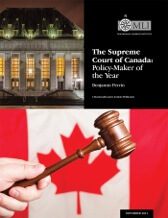New study finds that the Supreme Court’s rulings over the past year will spark a lasting impact on public policy and on the top Court’s relationship with the federal government.
OTTAWA, Nov. 27, 2014 – Senate reform. Canada’s prostitution laws. A public dispute with the Prime Minister.
The Supreme Court of Canada was not short on making headlines in 2014. But what will be the lasting impact of the activities from Canada’s top court over the past year?
According to a newly-released paper from the Macdonald-Laurier Institute, the headlines weren’t misleading: 2014 was an historic year for the Supreme Court, both in the rulings it handed down and in its relationship with the federal government.
The study, written by MLI Senior Fellow Benjamin Perrin, declares the Supreme Court of Canada the “Policy-Maker of the Year” for 2014.
Perrin selected 10 of the SCC’s most important decisions released between November 2013 and October 2014 to determine whether it was an extraordinary year for the Court.
During that time, the court released decisions that struck down Canada’s prostitution laws, made a first-time ruling of Aboriginal title, rejected a government nomination for the Supreme Court and raised the bar for reforming the Senate.
Based on his analysis of these and other decisions, Perrin reaches three main conclusions:
- The policy and legal impact of the Supreme Court of Canada’s decisions of the last year are significant and likely enduring;
- The Supreme Court of Canada was a remarkably united institution with consensus decisions on these significant cases being the norm, and dissenting opinions rare; and
- The federal government has an abysmal record of losses on significant cases, with a clear win in just one in 10 of them.
The most significant decisions, Perrin says, relate to the rules surrounding how to amend the Constitution. The SCC’s ruling on changing the composition of either the Supreme Court or the Senate will entrench both institutions as “virtually untouchable”.
 The declaration of Aboriginal land title will have far-reaching consequences for provincial control over natural resources, while the ruling on prostitution laws is likely to change future interpretations of the Charter of Rights and Freedoms.
The declaration of Aboriginal land title will have far-reaching consequences for provincial control over natural resources, while the ruling on prostitution laws is likely to change future interpretations of the Charter of Rights and Freedoms.
Perrin also found no evidence to support the view that Prime Minister Stephen Harper’s appointees are carving out their own ideological space on the Court.
His analysis showed that the court reached a consensus decision in 80 per cent of these cases – higher than the average over the past decade.
“There is no evidence whatsoever of any observable split in the Court’s decisions on significant issues between the six judges appointed by Prime Minister Harper and the three judges appointed by previous prime ministers”, Perrin says.
On the federal government’s remarkable string of losses at the SCC, Perrin believes it’s time for a rigorous “post-mortem” of what went wrong. Did the government, for example, receive bad legal advice? Could the government have done a better job of arguing the case before the court?
“Until this is exhaustively done, it would be premature, as some commentators have suggested, to conclude that there is a fundamental rift in values between the federal government and the Court”, says Perrin.
However, he believes it’s important for Canada that the government take a hard look back at 2014.
“If the norm becomes a united Court handing down losses to the federal government, there is a risk of increasing tensions and frustrations by the federal government where the Supreme Court of Canada is viewed as an impediment to legal and policy reforms – this would not be healthy for our democracy or the proper functioning of either body”.
To read the full report, click here.
***
Benjamin Perrin is an Associate Professor at the University of British Columbia, Faculty of Law and a Senior Fellow at the Macdonald-Laurier Institute. He previously served as Special Adviser, Legal Affairs & Policy in the Office of the Prime Minister and was a Law Clerk at the Supreme Court of Canada.
The Macdonald-Laurier Institute is the only non-partisan, independent national public policy think tank in Ottawa focusing on the full range of issues that fall under the jurisdiction of the federal government.
For more information, please contact Mark Brownlee, communications manager, at 613-482-8327 x105 or email at mark.brownlee@macdonaldlaurier.ca. On Twitter @MLInstitute




